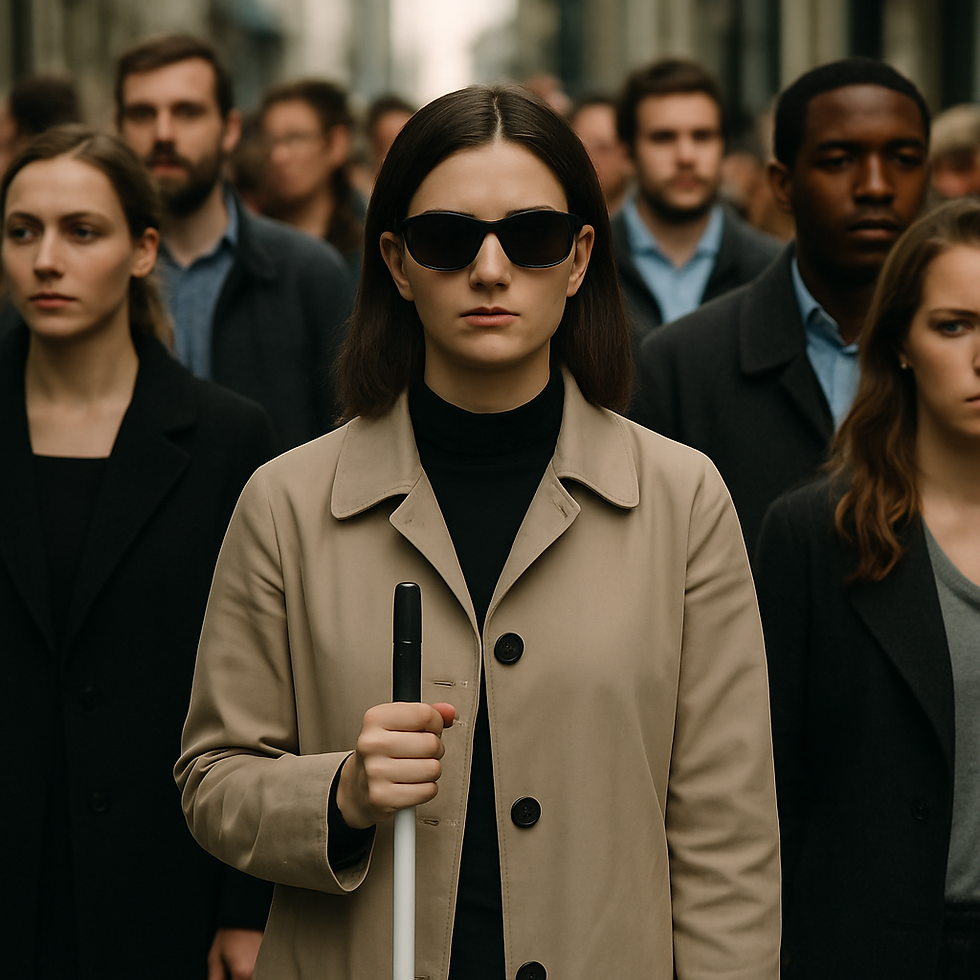Ableism In Short
- Michelle Friedman
- Oct 19, 2022
- 4 min read
Updated: Apr 8, 2025

“Ableism” is a term that many people may not be familiar with. In general, it refers to the
pervasive devaluing of people with disabilities because of their disabilities, regarding those
disabilities as abnormal, in need of “fixing.” It is the subtle-- and sometimes not so subtle--
message that people with disabilities are somehow less than people without them. Some
examples of this concept include the time recently when I met a colleague for the first time and he remarked, “Oh, you don’t look blind.” He meant it as a compliment. Or take the journalist who wrote about being “inspired” by a veteran who uses a wheelchair and goes to work every day, supporting his family. My question to these people would be “How is a blind person supposed to look?” and “Is someone who doesn’t use a wheelchair and goes to work to support his family also ‘inspirational’?”
Most people are unaware of the impact of their words or their actions. But ableism is rooted in lack of knowledge, understanding, and sometimes fear.
As children, we get messages both directly and indirectly from the adults in our lives. These
messages shape our future beliefs, values, assumptions, and feelings. A young child with innate curiosity might ask about someone in a wheelchair. If his parent shushes him and admonishes him not to stare, instead of smiling and giving a simple explanation, the child will naturally get the message that disability is shameful, perhaps fearsome—at the very least, not something to be spoken about.
When ableism permeates an institution or is allowed to be systemic, the discrimination is much more obvious: It may include physical barriers to accessibility, policies, laws, and regulations that exclude people with disabilities from full participation and equal opportunity. Some examples of systemic ableism include buildings with stairs and no ramps, conferences with no sign language interpreters, and inaccessible websites (those that preclude blind people from using them). Another example is schools that segregate disabled children or fail to accommodate them.

Ableism is seen in how our media, books, and conversation reflect what is considered valued, normal, or beautiful. It is seen when diversity and inclusion—today’s buzzwords-- do not include disability.
We have a long history of cultural and institutional prejudice towards people with disabilities.
For many years, children with disabilities were institutionalized, often in deplorable conditions.
They were hidden away, sometimes not talked about. Eugenics, a field of “medicine” that
allowed people considered inferior to be killed or experimented on, included people with
disabilities. Not so long ago, there were no laws advocating for the rights of disabled children and adults in schools, workplaces, housing and other venues. Society looked at disability through a medical lens rather than through a social justice one.
There is only one way to combat ableism and that is to change attitudes first. The way to do this is through education, information, and everyday interactions with disability.
I know that it will be hard to change some people’s opinions. But we have to try. We have to try to make disability just another part of the human experience. Differences make for a diverse society, a valuable one. We have to get people to see how disability augments the picture of a just society.
Here’s how we accomplish this:
Have non-disabled and disabled children interact with one another from an early age in school, in camp, and in any environment where children naturally gravitate. Support and accommodate disabled children in these places so that the message is clear: They belong.
Continue to include programs on tolerance and acceptance in all curricula. Alongside instruction about the civil rights movement and the Holocaust, teach the disability rights movement as well.
Change the language we use when we talk about disability. In “ableist” language, we say we “take care of” someone in a wheelchair, or a person “suffers” from Autism, or is “afflicted” with blindness. Stop saying children are “typically developing” or “normally developing.” The implication is that those with disabilities are atypically or abnormally developing.
Some people may find it uncomfortable to refer to someone with a disability. Perhaps they have never had any interaction with a person with a disability. Without meaning to offend, these well-meaning people struggle with the proper language to use. After all, each person has his or her own preference—a statement that doesn’t just apply to people with disabilities! The “person language first” dilemma comes into play here: Am I a person who is blind or a blind person? There is a simple way out of this confusion. Ask the person!
Personally, I don’t mind being called a “blind woman.” That is what I am. (But of course, I am
so much more). The point is-- start the conversation! It is only through education that we will
develop new attitudes.
Ableism and other forms of discrimination can only be combatted if we talk about
it! A critical factor is showcasing individuals with lived experience. Share and
empower the voices of people with disabilities. Nothing about us without us! That
is a rallying cry. But I would add “Nothing for or about us, without us!”
When everyone is included, part of the conversation, part of a welcoming society,
everyone benefits. When disability is seen as a natural part of the human condition,
our society will be diverse, equitable, and inclusive.
If you want to learn more about disability, the disability Rights movement and disability justice, and I hope you will, here are a few books I recommend.
Demystifying disability: What To Know, What to say and How to Be, by Emily Ladau
Nothing About Us Without Us: Disability Oppression and Empowerment, James I. Charlton
Being Human: An Unrepentant Memoir of a Disability Rights Activist, by; Judith Heumann
Just Human: The Quest for Disability Wisdom Respect and Inclusion, by; Arielle Silverman
PH.D
We’re Not Broken, by; Eric Garcia






Comments